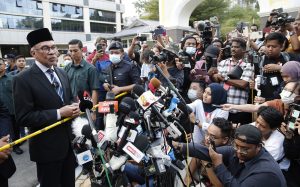Millions of Malaysians went to the polls on November 19 for the country’s 15th general election since independence. The poll generated a lot of interest as the first since the beginning of the COVID-19 pandemic, which largely shut down the economy for two years and caused thousands of deaths. Far more importantly, the election was presented as an opportunity for Malaysia to regain political stability after a long spell of weak and unstable government.
In 2018, Malaysia underwent the first change of regime in its modern history, when the United Malays National Organization (UMNO) and its Barisan Nasional (BN) coalition lost for the first time since independence in 1957. Since then, Malaysia has undergone two more changes in government, both “backdoor” governments in which defections resulted in the installment of new prime ministers. Thus, between this election and the last, after six decades under UMNO/BN rule, Malaysia saw three different prime ministers and three different administrations in four years.
The election was called in October by UMNO, emboldened by its strong performance in state elections in Melaka and Johor. UMNO obtained super majorities in both states and the party thought that the momentum generated would mean similar results at a general election. Ultimately, they were mistaken.
The Main Players
The November 19 election was marked by a fragmented political landscape involving five main camps. The first was the BN coalition under UMNO President Ahmad Zahid Hamidi. As mentioned, BN/UMNO ruled the country continuously from independence until its shock defeat in 2018. Even then, it only lost power when the gargantuan 1MBD corruption scandal became too big for the population to swallow.
The second major player was the Pakatan Harapan (PH) coalition under perennial opposition leader Anwar Ibrahim. This election was widely considered the last chance for Anwar, who is 75 years old, to fulfil his long-held ambition to become prime minister. He had made at least four serious attempts in the previous three years to claim the top job but had been thwarted each time.
The third challenger was the Perikatan Nasional (PN) coalition under Muhyiddin Yassin. Muhyiddin was the one who led the internal coup that caused the downfall of the PH government in 2020. He subsequently became prime minister but was forced to resign in August 2021, when UMNO withdrew its support for his administration.
Fourth was the Gabungan Parti Sarawak (GPS) coalition under Abang Johari. Unlike the other main players, GPS does not operate nationally. It is the ruling coalition in Sarawak state on the island of Borneo. It stands for a state nationalist vision of “Sarawak First,” and is only really interested in winning complete autonomy for the state.
The fifth, and probably the least significant, of the electoral players was the Gerakan Tanah Air (GTA) coalition, led by Mahathir Mohamad. Unlike in 2018, Mahathir played a rather marginal role in this year’s election.

































